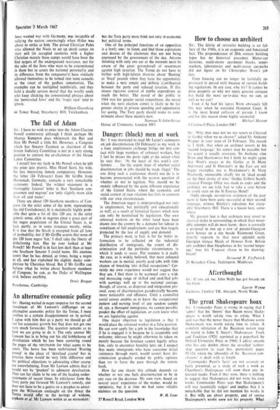Danger: (black) men at work
Sir: I was interested to read Mi Lester's comments on job discrimination (24 February) as my work in a busy employment exchange brings me into con- tact with large numbers of coloured workers, but I feel he misses the point right at the outset when he says that: 'At the heart of this week's con- ference . . . lies the urgent issue of whether racial discrimination in jobs should be made illegal.' The one thing such a conference should not do is to become preoccupied with the narrow question of whether or not to legislate. Nor should we be
unduly influenced by the quite different experience of the United States, where the economic and social context of race relations has little in common with our own circumstances.
The American negro is underprivileged not only in employment, but politically and educationally as well, as a result of historical factors which now can only be neutralised by legislation. Our own coloured workers on the other hand have been drawn into the country by a demand for labour in conditions of full employment, and are thus largely protected by the law of supply and demand.
The primary need, in fact. is for far better in- formation to be collected on the industrial distribution of immigrants, the extent of dis- crimination and the particular circumstances in which it tends to occur. For instance is it really the case, as is widely believed, that most coloured workers are in menial, poorly paid jobs with little chance of breaking into skilled occupations? Cer- tainly my own experience would not auggest that they are. I find them to be scattered over a wide and increasing range of skilled and unskilled jobs with earnings well up to the national average, though, of course, as dispersal and integration pro- ceed, cases of discrimination paradoxically become more noticeable and offensive Until a controlled social survey enables us to know the occupational pattern and earning level of any random sample of, say, a thousand immigrants, we cannot possibly predict the effect of legislation, or even know what we are legislating against.
One major objection to legislation is that it would place the coloured worker in a false position. He can now apply for a job in the knowledge that if he is engaged it is because he is acceptable and welcome; whereas he might otherwise be taken on merely because the foreman cannot legally refuse him, only to encounter hostility later on. I suspect that many immigrants who have overcome initial resistance through merit, would sooner have dis- crimination gradually eroded by public opinion than try to force the pace through the statute book.
How far one shards this attitude depends on whether or not one feels discrimination to be in any case on the decrease. My own view, based on several years' experience of the matter, would be optimistic, but it is time we had some reliable statistics on the question.


































 Previous page
Previous page